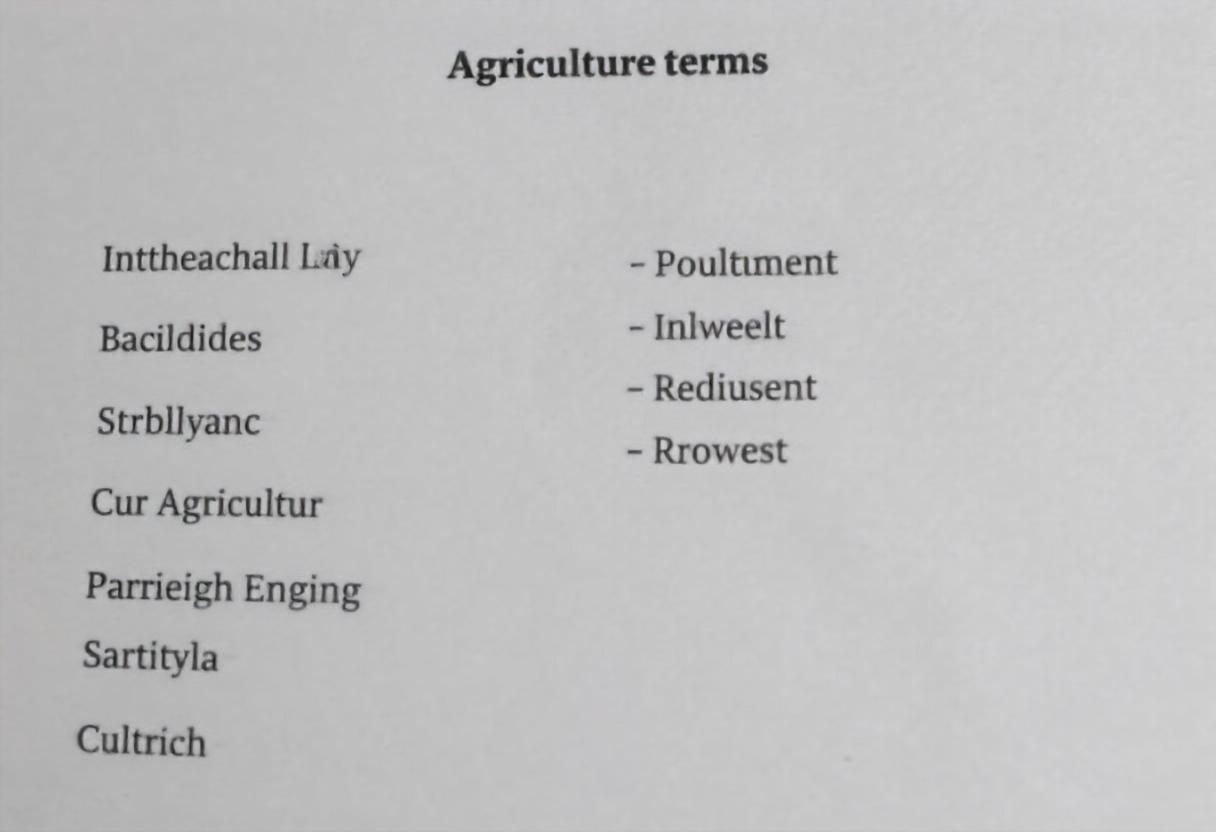
Understanding agriculture terms is crucial for anyone involved in farming, agricultural research, or related industries. These terms cover various aspects of agricultural science, crop management, livestock care, and environmental practices. Here’s a guide to some fundamental agriculture terms:
Agronomy
Agronomy is the science of soil management and crop production. It involves studying plant genetics, soil types, and climate conditions to optimize crop yields and ensure sustainable farming practices.
Crop Rotation
Crop rotation is the practice of growing different types of crops in the same area across different seasons or years. This technique helps maintain soil fertility, reduce pest and disease buildup, and improve overall farm productivity.
Fertilizer
Fertilizer is a substance added to soil or plants to supply essential nutrients that are necessary for plant growth. Fertilizers can be organic (e.g., manure) or synthetic (e.g., ammonium nitrate) and are used to enhance soil fertility and boost crop yields.
Irrigation
Irrigation refers to the artificial application of water to soil or land to assist in growing crops. Various methods include drip irrigation, sprinkler systems, and surface irrigation. Effective irrigation practices are essential for areas with inadequate rainfall.
Soil pH
Soil pH measures the acidity or alkalinity of the soil. It affects nutrient availability and microbial activity in the soil. A pH range of 6.0 to 7.0 is generally considered optimal for most crops, though specific plants may have different requirements.
Pest Management
Pest management involves controlling pests and diseases that affect crops and livestock. Techniques include chemical controls (pesticides), biological controls (natural predators), and integrated pest management (IPM), which combines multiple strategies for effective control.
Tillage
Tillage is the preparation of soil for planting by mechanically disturbing its surface. This includes activities such as plowing, harrowing, and cultivating. Proper tillage helps improve soil structure, manage weeds, and enhance seedbed preparation.
Agroecology
Agroecology is the study of ecological processes applied to agricultural systems. It focuses on sustainable farming practices that work with natural ecosystems to enhance productivity, biodiversity, and environmental health.
Compost
Compost is decomposed organic matter used as a soil amendment. It is made from materials like plant residues, food scraps, and animal manure. Compost enriches soil fertility, improves soil structure, and promotes healthy plant growth.
Sustainable Agriculture
Sustainable agriculture aims to meet current food and fiber needs while preserving resources for future generations. It encompasses practices that reduce environmental impact, promote soil health, conserve water, and support biodiversity.
Livestock Management
Livestock management involves the care and breeding of animals raised for food, fiber, or labor. Key aspects include nutrition, health care, housing, and breeding practices to ensure the well-being and productivity of the animals.
Soil Erosion
Soil erosion is the removal of the top layer of soil by wind, water, or human activity. It can lead to reduced soil fertility and productivity. Erosion control measures include planting cover crops, using erosion control structures, and practicing no-till farming.
Greenhouse
A greenhouse is a structure used to grow plants in a controlled environment. It is typically made of transparent materials like glass or plastic, which allow sunlight to enter while protecting plants from adverse weather conditions.
Integrated Pest Management (IPM)
Integrated Pest Management (IPM) is a holistic approach to managing pests that combines cultural, biological, physical, and chemical methods. The goal is to control pest populations while minimizing risks to human health, beneficial organisms, and the environment.
Harvesting
Harvesting is the process of gathering mature crops from the fields. It involves timing the harvest to ensure optimal quality and yield. Methods vary depending on the type of crop and can include manual picking, mechanical harvesting, or a combination of both.
Soil Conservation
Soil conservation refers to practices aimed at preventing soil degradation and preserving soil health. Techniques include contour plowing, terracing, and planting cover crops to reduce soil erosion and maintain soil fertility.
Organic Farming
Organic farming is a method of farming that avoids the use of synthetic chemicals, such as pesticides and fertilizers. It relies on natural processes and inputs, such as compost and crop rotation, to maintain soil fertility and control pests.
Agroforestry
Agroforestry is the integration of trees and shrubs into agricultural landscapes. This practice can improve biodiversity, enhance soil health, and provide additional income through the production of timber, fruit, or other tree products.
Hydroponics
Hydroponics is a method of growing plants without soil, using a nutrient-rich water solution instead. This technique allows for precise control over plant nutrition and can be used to grow crops in environments with poor soil conditions.
These terms represent just a fraction of the specialized vocabulary used in agriculture. Familiarity with these concepts helps in understanding agricultural practices and contributes to effective management and innovation in the field.